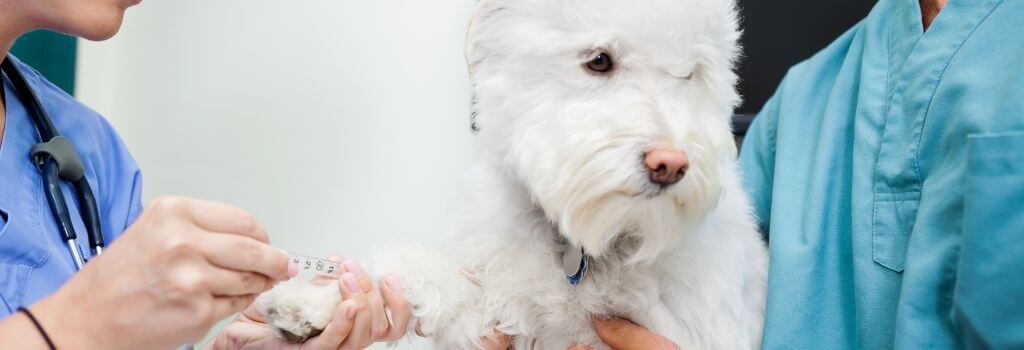We all want our dogs and cats to live long and healthy lives, but what if your pet was suffering from a hidden health issue without showing any obvious signs? Though your pet may be acting like their normal, energetic, and affectionate self, the reality is that they could be silently dealing with illness or pain without your noticing.
Fortunately, there's a simple way to catch many of these issues early: an annual blood test.
Bloodwork is one of the most powerful tools in preventive veterinary care. It can uncover health conditions before they become serious, help guide treatment, and in some cases, even save your pet's life. In this article, we'll explore why annual blood tests are so important for both cats and dogs, what they can detect, and what to expect when your pet gets tested.
Why Annual Bloodwork Can Be Life-Saving for Your Pet
When it comes to keeping your pet in good health and getting the best outcomes for any health scares that do happen, early detection and intervention are the name of the game. So many of the painful and dangerous health conditions that our pets can suffer from during their lifetime are often easily treated or managed if caught early enough – and that's where annual pet bloodwork comes in.
Annual bloodwork is one of the best ways to establish a baseline for your pet's health and give your veterinarian an idea of what your dog or cat's "normal" is when it comes to blood chemistry and organ function. Having reliable baselines for a pet's health is incredibly important in veterinary medicine, as it gives your veterinary care team a reference point to refer back to in the event that your pet does become ill or starts displaying concerning behaviors or symptoms.
When health conditions are caught early, your veterinarian can:
- Start treatment before damage becomes severe (like in kidney disease or diabetes)
- Prevent complications from worsening or spreading (such as infections or tumors)
- Slow the progression of chronic diseases, giving pets a longer, healthier life
- Avoid emergency situations that are stressful, costly, and sometimes less treatable
- Improve your pet's quality of life with earlier pain management or supportive care
In many cases, early detection through bloodwork can be the difference between life and death. For example, chronic kidney disease in cats often goes unnoticed until it's advanced - unless caught early through routine testing.
No veterinarian or owner wants that fate for an animal, so staying on top of regular cat and dog bloodwork needs cannot be recommended enough.

Pet Blood Tests and What They Can Detect
Typical pet blood tests that are performed annually are a Complete Blood Count, a Blood Chemistry Panel, and, for seniors, a thyroid panel.
- Complete Blood Count (CBC) checks for infections, inflammation, anemia, and blood-related cancers by evaluating red and white blood cells and platelets. This essentially tells us what the blood is doing in the body, and can show us if there are signs of infections, anemia, or even signs of dehydration.
- A blood chemistry panel provides a veterinarian with a complete look at your pet's organ function, often revealing signs of kidney disease, liver disease, diabetes, pancreatitis, and electrolyte imbalances.
- A thyroid panel measures the levels of thyroid hormones — primarily T4 (thyroxine) — in your pet's blood. Imbalances in T4 levels in cats and dogs can indicate thyroid dysfunction and signal to a veterinarian that a pet may have hypothyroidism (low levels of T4) or hyperthyroidism (high levels of T4), which can both lead to unwanted secondary health complications.
What to Expect When It's Time for a Pet Blood Test
Aside from the benefits of being able to keep tabs on your pet's health and being able to intervene early if something is wrong, the best thing about an annual pet blood test is that it's quick and virtually painless for your pet. Let's break down what you can expect once your veterinary care team recommends a pet blood test.
For annual blood work, samples will be collected during your pet's yearly wellness visit. A veterinary technician or the veterinarian themselves will gently draw a small amount of blood using a fine needle – something your pet will barely feel.
Once the sample has been collected, a member of the veterinarian team will take it to an in-house lab or a partner laboratory for analysis. During our analysis, we look at the trends of your pet's specific blood values to look at any changes that could show early health issues. For regular bloodwork findings, it can take a few days for results to become available, so you won't receive results during your initial visit. Your veterinarian will reach out as soon as possible with the results to let you know if there were any concerning findings in your cat or dog's bloodwork or any trends or changes that warrant a closer look.
In addition to regular pet blood tests, your veterinarian may recommend some additional testing and lab work to address concerning trends or irregular findings. The recommendations your veterinarian makes can depend on your pet's age, health status, and what kind of abnormalities were discovered in the blood work or other diagnostic procedures. Depending on the abnormality, we may have to do further diagnostic tests like urinalysis or radiographs to rule out certain conditions with overlapping symptoms.

Do Cats Need Annual Blood Work?
When we talk about annual vet visits and lab work, many pet owners will assume we're really just talking about these needs for dogs – but that couldn't be further from the truth. Many people incorrectly assume that cats don't need as much veterinary care as dogs because they are low maintenance and aren't exposed to as many diseases and illnesses as their canine counterparts. These beliefs lead to many cats in the United States not receiving annual veterinary care, like wellness checkups, vaccinations, and routine bloodwork. In fact, at one point, it was estimated that half of the cats in the U.S. did not visit a veterinarian annually for wellness and preventive care.
Cats are exceptionally good at hiding pain and illnesses from their owners and veterinarians, making regular checkups and lab work an absolute necessity to keep them in good health. Having bloodwork done regularly can help your veterinarian identify any concerning changes or trends in your cat's health and address them before they become serious.
Special Exceptions for Senior Pets
While regular pet blood tests are important for every dog and cat, senior pets benefit the most from routine bloodwork as they are more prone to age-related diseases. Younger pets without chronic health conditions can typically stick to a yearly schedule for bloodwork, but senior pets should ideally have a blood test done every six months to help veterinarians catch diseases early.
For example, more frequent bloodwork is highly recommended for senior cats, as they are prone to developing kidney disease and hyperthyroidism as they age, and some of the symptoms of these two diseases can commonly be missed by pet owners or incorrectly attributed to the cat getting older.
Don't Forget to Schedule an Annual Pet Blood Test – Your Pet Deserves the Best Care
Routine bloodwork is a great investment in your pet's health and a good way to catch health issues early. Early detection means early intervention for health issues that could cause your pet pain or even shorten their lifespan. So get your pet the preventive care they deserve, and be sure to stay on top of yearly wellness checkups and the tests and examinations that come with them!
If you have questions and you'd like to reach out to us, you can call us directly at (218) 692-4400, or you can email us at [email protected]. Don't forget to follow us on social media Facebook, Instagram.

